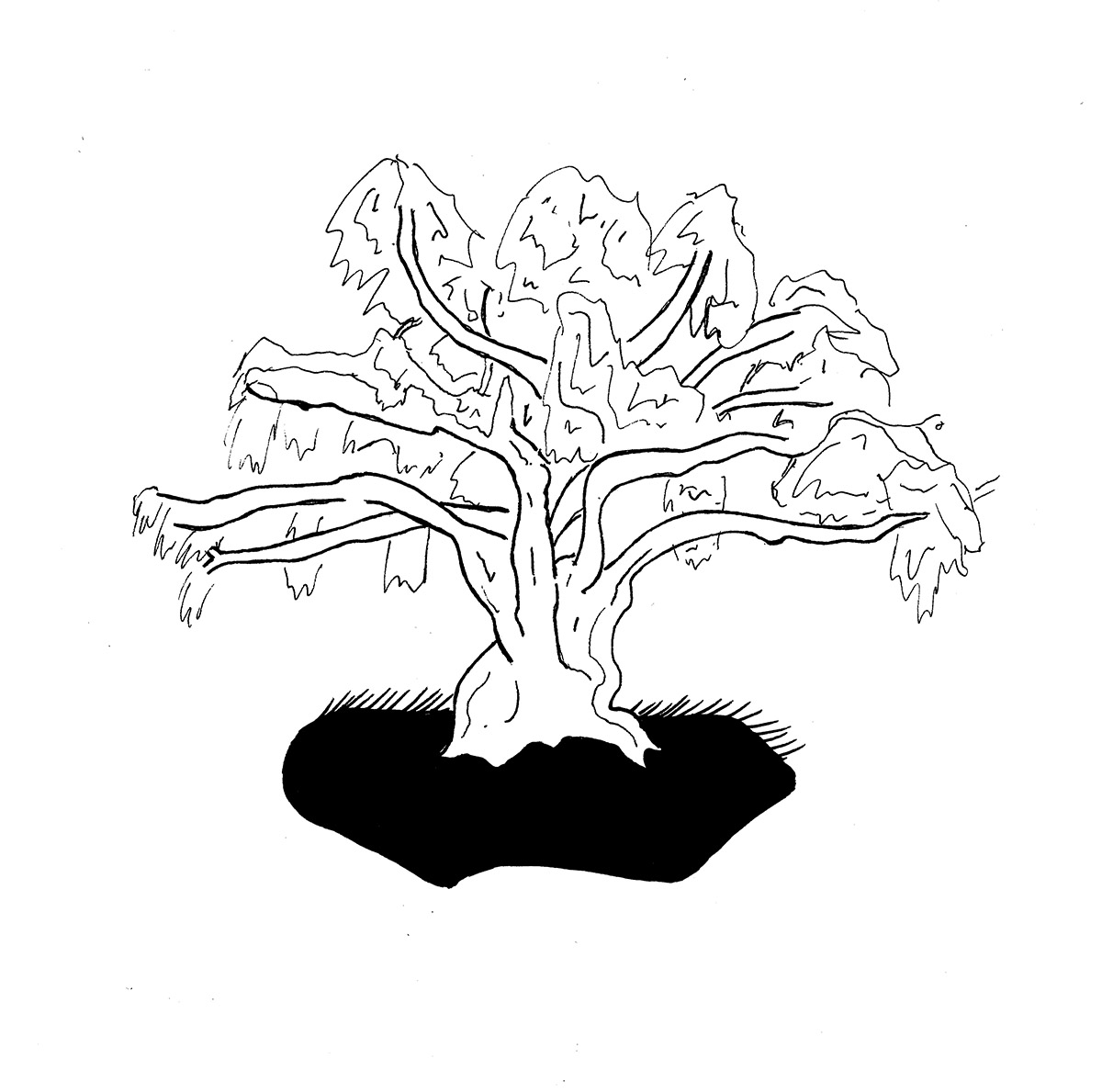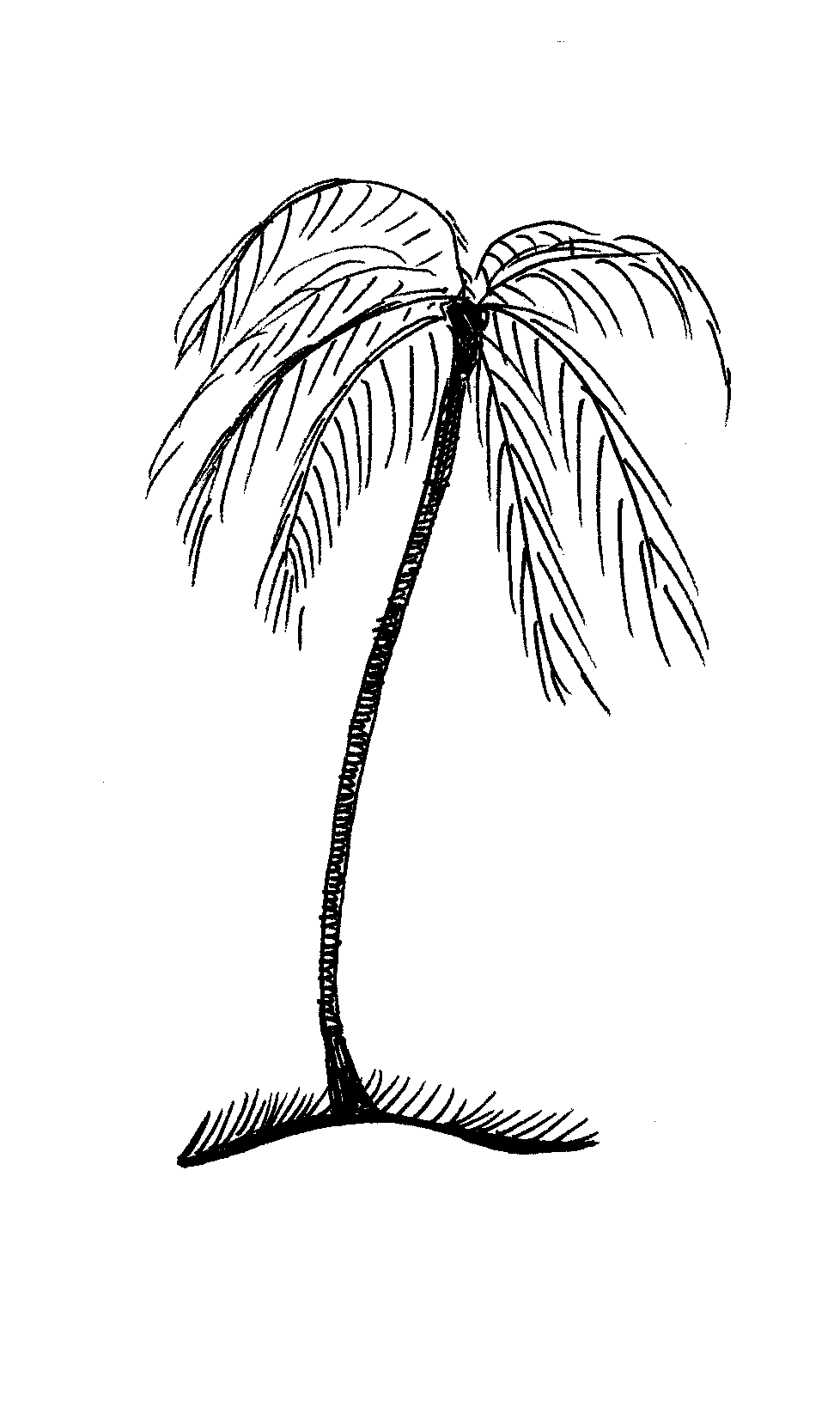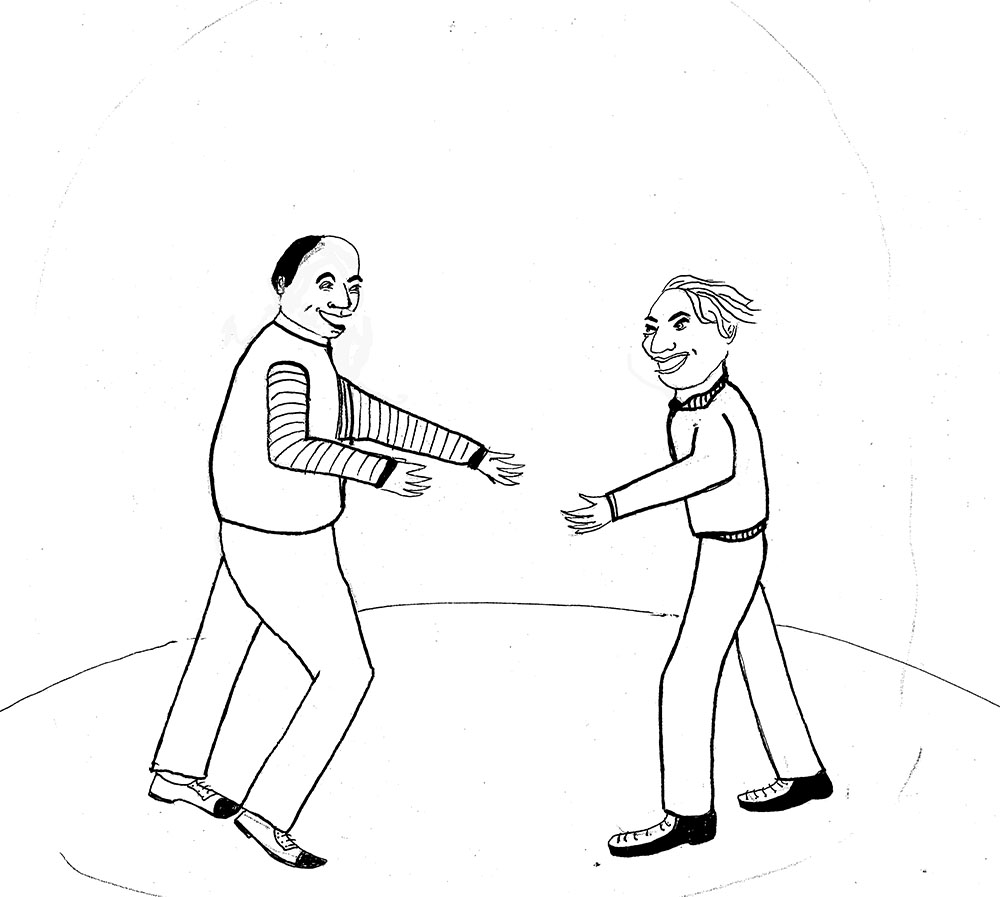Chaver Paver (Gershon Einbinder): Those Years in Los Angeles (Zalmen Pt. 4)
Those Years in Los Angeles (Yene Yorn in Los-Andzsheles)
from Zalmen the Cobbler: Chapters about his 70 years of Life in America (Zalmen der shuster: kapitlen vegn zayne zibtsik yor lebn in Amerike) by Chaver Paver (Gershon Einbinder). Los Angeles: Chaver-Paver Book Committee, 1955: 211-215.*
Translated by Caroline Luce, edited by Hershl Hartman.
My landsman Noah, the former baker, found joy in California not only because, in his later years, he became a father and not only because an orange tree was growing in his yard, but also because he could attend lectures in the evening. In Los Angeles he had become an enthusiastic lecture-goer. There was no lecture in the city that he missed. This was his way of making up for the time in New York when he could not go to lectures because he worked nights.
I myself also thirsted for a lecture in Yiddish, as good Yiddish speakers seldom came to Nashville. So I went with Noah. It was a Friday evening. Bright, clear stars lighted the sky and the California night air was fragrant, as with precious perfumes. Noah told me that the fragrance was that of the pepper-tree. During the day I had seen a pepper-tree and it was much to my liking. The leaves were small and pretty, with lacy edging, and the trunk was very dark gray and thick, with the branches hanging down toward the earth. I laughed to myself that this tree was called a pepper-tree because its aroma was not that of pepper. However, because of its sweet and spicy fragrance I began to sneeze as though from the pungent odor of pepper. Noah told me that there were people who sneeze through the night and actually because of the pepper-tree.
During the day I had seen a pepper-tree and it was much to my liking. The leaves were small and pretty, with lacy edging, and the trunk was very dark gray and thick, with the branches hanging down toward the earth. I laughed to myself that this tree was called a pepper-tree because its aroma was not that of pepper. However, because of its sweet and spicy fragrance I began to sneeze as though from the pungent odor of pepper. Noah told me that there were people who sneeze through the night and actually because of the pepper-tree.
Noah led me through the streets of Boyle Heights to Soto Street. He wanted to show off Soto Street, the most beautiful street in Boyle Heights. As is usual, the most beautiful street in any city is inhabited by the more wealthy. It really was then the finest street in the area. A broad street with fine homes on both sides, with well cared-for lawns, flowering bushes and tall palm trees as though somehow in a dacha [Russian country-home]. Somehow, I had not liked the palm trees by day, only at night. By day, the tall palm trees looked like brooms on very long sticks. Their trunks were wrapped in a kind of brown straw, and they were without branches except high up, at the very top, where there were a few branches with leaves. On a starry night, however, they look like ancient gigantic creatures who had been stationed there to keep an eye on the stars and all the surroundings throughout the entire night.
So we strode through Soto Street to Brooklyn Avenue, enjoying the beautiful street and the lovely fragrant California night. The beauty was somewhat disturbed for me, however, when I heard very vulgar curses and in Yiddish, yet. More fitting on such a fine night and in such fine houses would have been words of blessing rather than cursing.
On Brooklyn Avenue we got on a trolley-car, a very tall and wide trolley-car into which we had to climb by a few ladder-like steps. Inside it was very homey. The car was filled with Jews freely speaking Yiddish, as though in their own homes. According to the words I caught, many of them were going downtown to a meeting of an Arbeter-Ring [Workmen’s Circle] branch and many others were traveling to where Noah and I were headed, that is, to the lecture.
We approached a wooden bridge and the trolley stopped to allow another trolley-car, going in the opposite direction, to pass. Only one set of tracks ran across the bridge and when the other trolley crossed the bridge the boards shrieked noisily. The bridge just barely stood up and threatened to cave in at any moment. It actually did collapse a few years later, when it was replaced with a wide, solid, stone bridge, and today handsome trolleys cross it without any tracks having been placed there. These days, tracks are no longer necessary.
Noah the Baker led me downtown to Court Street, not far from Temple Street. It was on Temple Street that the founding Jewish community of Los Angeles had been located. But when I arrived, it was already in the process of decline, and the crown had been passed to Boyle Heights. Today, 35 years later, Boyle Heights, too, is on the verge of extinction as the leading Jewish settlement, and the crown has been passed to Beverly-Fairfax.
On entering the lecture hall I immediately felt happily at home. Noah introduced me to his Los Angeles friends, and sholem aleykhem greetings flew at me from every direction. They immediately accepted me as an equal and as one of their own. That anyone attending a lecture on the second night of his arrival in Los Angeles was proof, in itself, that he was one of them, a devotee of Yiddish literature.
What increased my sense of hominess was the arrival of Aaron Goldblatt, my train-brother. We embraced like two very old friends. Aaron Goldblatt was totally radiant. It will be a joy to live in Los Angeles, he said to me, not only because of the eternal sunshine but also because people gather often for lectures and discussions, and it will not be culturally lonely.

At that time and until just before our present time, a Doctor Blass was famous among the Jews of Los Angeles. Legends about him were abundant even in his lifetime. He was a medical doctor who did not want to accept money from poor patients. To the contrary, he would slip some coins into the hands of such patients to buy medicine. His outer manner toward patients seemed somehow to be an angry one. He was always shouting, even cursing sometimes.
“Look here, peddler,” he would shout to anyone of them who offered him a dollar, “have you become so rich that you throw your dollars around?! Behold him, this so-rich man! Better to use it for your wife and children, whose lives with you are so dark and painful. O and woe to the kind of earner you are.”
Doctor Blass was so fond of Yiddish and Yiddish literature that this, too, was a source of legends and jests. I will yet return to him in my later stories. Doctor Blass was flushed, of middle-height, fleshy, and terribly near-sighted, with very thick lenses in his spectacles. He frequently gave lectures at the Jewish Institute on Court Street, covering various themes but chiefly aspects of Yiddish literature. That evening he spoke about Mani Leyb and read many of his poems. He could read very well, that Doctor Blass. It was so still as he read that you could almost hear the heartbeats of the audience. Oh, what a dear audience this was! Many of them had diseased lungs, advanced rheumatism, lonely people gathered here from all corners of America and now at a lecture where it seemed the Divine Presence rested upon them. Radiant people.
And my landsman Noah the Baker, actually slept soundly through the lecture. I did not want to wake him because he slept so joyfully it appeared he was having the brightest of dreams. I later learned that he slept through almost all the lectures that were especially appealing to him. At lectures that did not appeal to him he could somehow not sleep, and would sit there disturbed and angry...
* This translation, including the title, has been adapted from Henry Goodman's translation that appeared in Clinton Street and Other Stories (New York: YKUF Publishers, 1974): 128-130, in order to make the translation more complete and accurate.
from Zalmen the Cobbler: Chapters about his 70 years of Life in America (Zalmen der shuster: kapitlen vegn zayne zibtsik yor lebn in Amerike) by Chaver Paver (Gershon Einbinder). Los Angeles: Chaver-Paver Book Committee, 1955: 211-215.*
Translated by Caroline Luce, edited by Hershl Hartman.
My landsman Noah, the former baker, found joy in California not only because, in his later years, he became a father and not only because an orange tree was growing in his yard, but also because he could attend lectures in the evening. In Los Angeles he had become an enthusiastic lecture-goer. There was no lecture in the city that he missed. This was his way of making up for the time in New York when he could not go to lectures because he worked nights.
I myself also thirsted for a lecture in Yiddish, as good Yiddish speakers seldom came to Nashville. So I went with Noah. It was a Friday evening. Bright, clear stars lighted the sky and the California night air was fragrant, as with precious perfumes. Noah told me that the fragrance was that of the pepper-tree.
 During the day I had seen a pepper-tree and it was much to my liking. The leaves were small and pretty, with lacy edging, and the trunk was very dark gray and thick, with the branches hanging down toward the earth. I laughed to myself that this tree was called a pepper-tree because its aroma was not that of pepper. However, because of its sweet and spicy fragrance I began to sneeze as though from the pungent odor of pepper. Noah told me that there were people who sneeze through the night and actually because of the pepper-tree.
During the day I had seen a pepper-tree and it was much to my liking. The leaves were small and pretty, with lacy edging, and the trunk was very dark gray and thick, with the branches hanging down toward the earth. I laughed to myself that this tree was called a pepper-tree because its aroma was not that of pepper. However, because of its sweet and spicy fragrance I began to sneeze as though from the pungent odor of pepper. Noah told me that there were people who sneeze through the night and actually because of the pepper-tree.
Noah led me through the streets of Boyle Heights to Soto Street. He wanted to show off Soto Street, the most beautiful street in Boyle Heights. As is usual, the most beautiful street in any city is inhabited by the more wealthy. It really was then the finest street in the area. A broad street with fine homes on both sides, with well cared-for lawns, flowering bushes and tall palm trees as though somehow in a dacha [Russian country-home]. Somehow, I had not liked the palm trees by day, only at night. By day, the tall palm trees looked like brooms on very long sticks. Their trunks were wrapped in a kind of brown straw, and they were without branches except high up, at the very top, where there were a few branches with leaves. On a starry night, however, they look like ancient gigantic creatures who had been stationed there to keep an eye on the stars and all the surroundings throughout the entire night.
So we strode through Soto Street to Brooklyn Avenue, enjoying the beautiful street and the lovely fragrant California night. The beauty was somewhat disturbed for me, however, when I heard very vulgar curses and in Yiddish, yet. More fitting on such a fine night and in such fine houses would have been words of blessing rather than cursing.

On Brooklyn Avenue we got on a trolley-car, a very tall and wide trolley-car into which we had to climb by a few ladder-like steps. Inside it was very homey. The car was filled with Jews freely speaking Yiddish, as though in their own homes. According to the words I caught, many of them were going downtown to a meeting of an Arbeter-Ring [Workmen’s Circle] branch and many others were traveling to where Noah and I were headed, that is, to the lecture.
We approached a wooden bridge and the trolley stopped to allow another trolley-car, going in the opposite direction, to pass. Only one set of tracks ran across the bridge and when the other trolley crossed the bridge the boards shrieked noisily. The bridge just barely stood up and threatened to cave in at any moment. It actually did collapse a few years later, when it was replaced with a wide, solid, stone bridge, and today handsome trolleys cross it without any tracks having been placed there. These days, tracks are no longer necessary.
Noah the Baker led me downtown to Court Street, not far from Temple Street. It was on Temple Street that the founding Jewish community of Los Angeles had been located. But when I arrived, it was already in the process of decline, and the crown had been passed to Boyle Heights. Today, 35 years later, Boyle Heights, too, is on the verge of extinction as the leading Jewish settlement, and the crown has been passed to Beverly-Fairfax.
On entering the lecture hall I immediately felt happily at home. Noah introduced me to his Los Angeles friends, and sholem aleykhem greetings flew at me from every direction. They immediately accepted me as an equal and as one of their own. That anyone attending a lecture on the second night of his arrival in Los Angeles was proof, in itself, that he was one of them, a devotee of Yiddish literature.
What increased my sense of hominess was the arrival of Aaron Goldblatt, my train-brother. We embraced like two very old friends. Aaron Goldblatt was totally radiant. It will be a joy to live in Los Angeles, he said to me, not only because of the eternal sunshine but also because people gather often for lectures and discussions, and it will not be culturally lonely.

At that time and until just before our present time, a Doctor Blass was famous among the Jews of Los Angeles. Legends about him were abundant even in his lifetime. He was a medical doctor who did not want to accept money from poor patients. To the contrary, he would slip some coins into the hands of such patients to buy medicine. His outer manner toward patients seemed somehow to be an angry one. He was always shouting, even cursing sometimes.
“Look here, peddler,” he would shout to anyone of them who offered him a dollar, “have you become so rich that you throw your dollars around?! Behold him, this so-rich man! Better to use it for your wife and children, whose lives with you are so dark and painful. O and woe to the kind of earner you are.”
Doctor Blass was so fond of Yiddish and Yiddish literature that this, too, was a source of legends and jests. I will yet return to him in my later stories. Doctor Blass was flushed, of middle-height, fleshy, and terribly near-sighted, with very thick lenses in his spectacles. He frequently gave lectures at the Jewish Institute on Court Street, covering various themes but chiefly aspects of Yiddish literature. That evening he spoke about Mani Leyb and read many of his poems. He could read very well, that Doctor Blass. It was so still as he read that you could almost hear the heartbeats of the audience. Oh, what a dear audience this was! Many of them had diseased lungs, advanced rheumatism, lonely people gathered here from all corners of America and now at a lecture where it seemed the Divine Presence rested upon them. Radiant people.
And my landsman Noah the Baker, actually slept soundly through the lecture. I did not want to wake him because he slept so joyfully it appeared he was having the brightest of dreams. I later learned that he slept through almost all the lectures that were especially appealing to him. At lectures that did not appeal to him he could somehow not sleep, and would sit there disturbed and angry...
* This translation, including the title, has been adapted from Henry Goodman's translation that appeared in Clinton Street and Other Stories (New York: YKUF Publishers, 1974): 128-130, in order to make the translation more complete and accurate.
| Previous page on path | Chaver Paver (Gershon Einbinder), page 4 of 13 | Next page on path |

Discussion of "Chaver Paver (Gershon Einbinder): Those Years in Los Angeles (Zalmen Pt. 4)"
Add your voice to this discussion.
Checking your signed in status ...